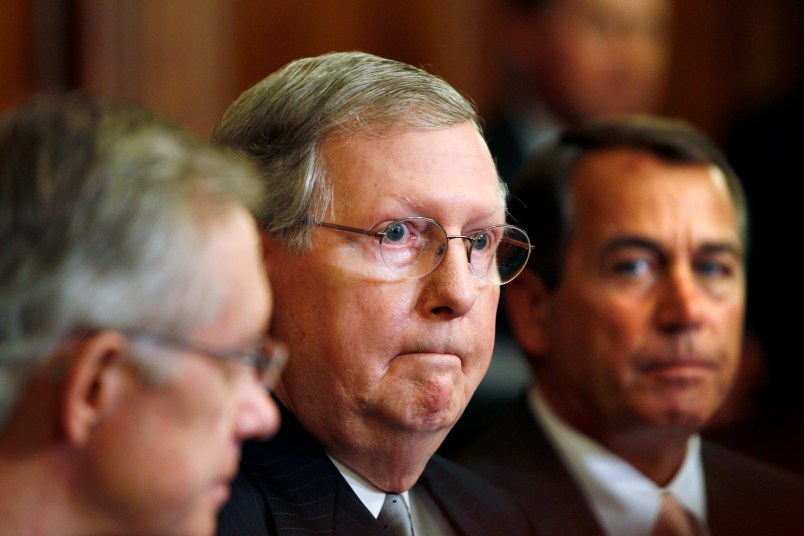Mitch McConnell met privately on Tuesday with House Republicans in an attempt to stiffen their spines and preserve the party’s leverage in the next government shutdown fight.
The Senate minority leader urged GOP members, including committee chairmen, who are voicing strong concerns with the painful military cuts under sequestration to hang tough and stand by the austerity spending level of $967 billion.
“I wish the budget conference well, but I do hope that at the end of the day we’ll support the Budget Control Act. It’s the law of the land,” McConnell told reporters afterward. “It sets out [spending] caps to be achieved. We know that it’s been highly successful. We’ve reduced for two years in a row for the first time since the Korean War. I think it’s a bad idea to revisit a law that is actually working and reducing spending for the government. Within those constraints, I wish them well. … I hope they will comply with the law.”
The Kentucky senator’s plea offers a glimpse into a central dynamic surrounding the Dec. 13 deadline for the budget conference committee to reach a deal, and more importantly the Jan. 15 deadline for Congress to keep the federal government funded or face another shutdown. The odds of a major deal are virtually nil and the focus is on how to ease the pain of the sequester. Like Democrats, Republican appropriators and defense hawks despise the sequester and want to get rid of it, perhaps even if it means compromising and replacing some of the cuts with new tax revenues. McConnell and Speaker John Boehner want to avoid that because the sequester is their crowning achievement.
“It’s an indication of the growing pressure from House Republicans to replace sequestration that McConnell felt the need to go to the House to pour cold water on a deal,” said a senior Senate Democratic aide familiar with budget negotiations. “The whole conversation around a small deal is how to replace sequestration — so McConnell will be the odd man out of he continues to put his personal politics above a bipartisan deal to avoid another crisis.”
Republican leaders and their anti-tax base want to sustain every dollar of spending cuts they’ve extracted. If members go soft, they may lose some of the sequester. But persuading skittish Republicans to stand by it would strengthen the party’s negotiating hand in the next budget battle, the thinking goes, ideally forcing Democrats to make unilateral spending concessions. It’s not an easy task because many Republicans are concerned with the next round of sequester cuts, which slash an additional $20 billion from defense spending.
Broadly, Democrats have the upper hand going into the Jan. 15 deadline after the GOP was badly bruised by the previous shutdown. Republican leaders, including McConnell, have vowed not to go there again. Democrats recognize that many Republicans are squeamish about the sequester and so they’ve demanded tax revenues be in the mix for any replacement. If they really wanted to play hardball, Democratic leaders would raise their demands and force Republicans into another shutdown, but there’s no indication that they’re planning on doing that.
McConnell’s calculus is also affected by his re-election bid in 2014. He still has to defeat a self-funded conservative challenger, Matt Bevin, before making it to the general election, and that requires burnishing his right-wing credentials. Allowing a tax-hiking deal to pass Congress would damage his standing with voters he’s relying on.
The minority leader’s office wouldn’t elaborate on the meeting with House colleagues.
“Sen. McConnell appreciates the efforts of Speaker Boehner and Rep. McMorris Rodgers, Chair of the House Republican Conference, to make time for his remarks today to the Conference,” said Don Stewart, a spokesman for McConnell. “He provided an update on the Senate and had a chance to hear directly from his House colleagues.”






